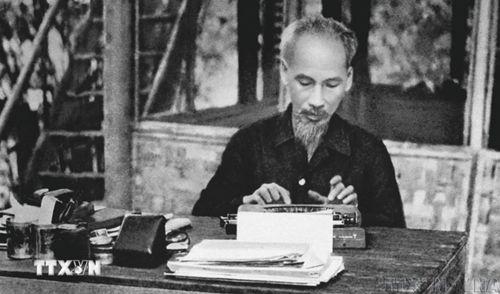Speaking to the Vietnam News Agency (VNA) on the occasion of the 100th anniversary of Vietnam’s Revolutionary Press Day (June 21, 1925 – 2025), Moonesinghe noted that from the earliest days of the resistance war against the colonialists, the Vietnamese revolutionary press did more than recording events, it was instrumental in national defense and in shaping the country's future.
    |
 |
|
President Ho Chi Minh, the great teacher of Vietnam’s revolutionary press. (File photo) |
Since President Ho Chi Minh founded Thanh Nien (Young People) newspaper in 1925, the Vietnamese revolutionary press has become the voice of the people. During the resistance war against the colonialists, journalists took great personal risks to inspire patriotism and the will of rising up against foreign invaders.
In the years of national reconstruction, Doi moi (Renewal), and global integration, the press has made substantial contributions to national development, anti-corruption efforts, and modernization process. In today’s digital era, amidst challenges like disinformation and deepfake technologies, the Vietnamese press has continued to stand firm in its mission to convey truthful information and uphold national values.
Moonesinghe affirmed that VNA has, since its inception, asserted its international standing by consistently delivering accurate and impartial information. He praised the agency’s commitment to innovation, including the adoption of multilingual platforms, AI applications, and engaging storytelling formats. The VNA has exemplified modern journalism: principled, responsible, and well-adapted to the digital age.
He also highlighted President Ho Chi Minh’s philosophy of journalism, encapsulated in the declaration: “Nothing is more precious than independence and freedom.” The President believed that journalists must uphold truth, responsibility, and ethics. He viewed the press as a revolutionary tool to inspire national pride and drive social progress, a vision that continues to shape editorial norms and professional standards in Vietnamese newsrooms today.
These ideals, Moonesinghe added, remain central to the mission of the Vietnamese media, reflected in core values such as service to the people, truthfulness, and national unity. Ethical pillars like transparency, integrity, clear communication, civic awareness, and a people-first approach continue to define the Vietnamese press, especially amid digital transformation and global integration. In other words, President Ho Chi Minh’s journalistic philosophy remains the guiding ethical compass for the Vietnamese press in the modern era.
Source: VNA